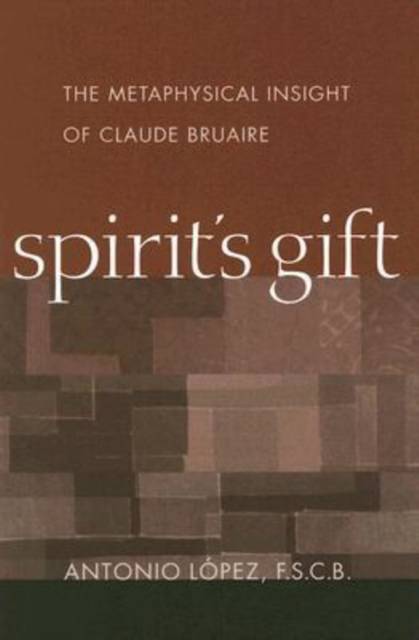
- Retrait gratuit dans votre magasin Club
- 7.000.000 titres dans notre catalogue
- Payer en toute sécurité
- Toujours un magasin près de chez vous
- Retrait gratuit dans votre magasin Club
- 7.000.0000 titres dans notre catalogue
- Payer en toute sécurité
- Toujours un magasin près de chez vous
Description
Spirit's Gift is the first book in English devoted to the philosophy of Claude Bruaire (1932-1986). Its focus is the notion of gift, a notion that has recently been the subject of lively debate involving Jacques Derrida, Jean-Luc Marion, Marcel Mauss, and others. What makes Bruaire's approach to this subject distinctive is that he treats it ontologically. This book critically examines the two main insights that govern Bruaire's ontology of gift (ontodology). First, gift is being in its spiritual way of being. "Spiritual" in this case does not stand for one quality among others, but, more radically, it is what makes being be itself. Second, being itself (ipsum esse) is gift only because, as Christian Revelation suggests, the fullness proper to pure act is first of all an absolutely free donation in itself and to itself before being donation to another (creation). The coalescence of being, freedom, and spirit grounds the claim that being is gift. Bruaire's thought is presented in dialogue with his two main sources: German Idealism (Hegel and Schelling) and Christian revelation.
Bruaire spent the bulk of his career as a professor at the Sorbonne in Paris. Although not himself a Hegelian, he enjoyed and enjoys great standing as a scholar of and commentator on Hegel's philosophy. With Marion, Bruaire was a founding member of the French edition of the theological journal Communio, and he was held in high regard by the great Swiss theologian Hans Urs von Balthasar. Bruaire's metaphysical account of gift also has affinities to that offered by Karol Wojytla---and subsequently developed under his pontificate as John Paul II.
While Bruaire's understanding of gift is decidedly philosophical, it is also of considerable theological interest, bearing as it does upon questions of Trinitarian theology, theological anthropology, and the Catholic sacrament of marriage. Rightly understood, his conception of gift sheds considerable light on the Thomistic understanding of Ipsum esse subsistens. It can also contribute to a philosophical retrieval of the category of causality and to the elucidation of the ontological ground of ethics.
ABOUT THE AUTHOR:
Antonio López, F.S.C.B., is assistant professor of theology at the John Paul II Institute for Studies on Marriage and Family at The Catholic University of America.
PRAISE FOR THE BOOK:
"This is a welcome book, well-written, well-researched, well-structured, and informed by philosophical thoughtfulness and theological discrimination. It is also a very helpful introduction to a thinker not well known in the English-speaking philosophical world." -- William Desmond, The Thomist
"Fr. Antonio Lopez has given the English language theological guild a terrifically important book. None of the major works of Claude Bruaire (1932-1986) have been translated, and few remain in print, which means that a set of stunningly creative texts on theological anthropology, metaphysics, philosophy of body, political philosophy, and bio-medical ethics is largely unacknowledged in the academy. Lopez walks the uninitiated skillfully through Bruaire's encounters with Aquinas, Hegel, Schelling, and Heidegger, en route to a reflection on gift that in so many ways surpasses the Levinasian frenzy of the more popular French and English phenomenological texts of the last two decades. . . . Lopez handles lucidly that perennially troubled frontier in the French academy between theology and philosophy. . . . Among the most helpful aspects of Lopez's book is his organization of the complicated collection of writings that Bruaire left behind. . . . Anyone interested in contemporary theology, especially as it crosses paths with French philosophy, critical theory, and even in this case analytic theories of logic, must simply read this book, and then begin clamoring for the wider introduction of Bruaire's work into the English-speaking academy.
Spécifications
Parties prenantes
- Auteur(s) :
- Editeur:
Contenu
- Nombre de pages :
- 262
- Langue:
- Anglais
Caractéristiques
- EAN:
- 9780813214436
- Date de parution :
- 20-06-06
- Format:
- Livre relié
- Format numérique:
- Genaaid
- Dimensions :
- 161 mm x 230 mm
- Poids :
- 607 g

Les avis
Nous publions uniquement les avis qui respectent les conditions requises. Consultez nos conditions pour les avis.






